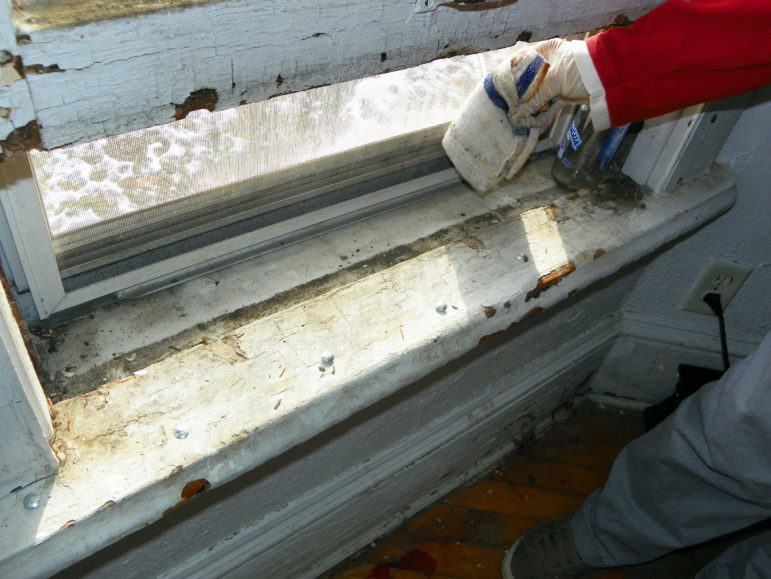Lead Paint, Poisoning Still An Issue
Some city neighborhoods have higher rates of lead poisoning than found during Flint water crisis.
Brain damage. Lower IQ. Behavioral issues. Irreversible. Permanent. When my infant son’s fingerstick came back positive for lead, these health effects of lead poisoning ran through my mind over and over. My spouse and I live in an older home and thought, what could have been the source? As a public health nurse, I considered myself knowledgeable about lead hazards and took steps to protect my family from the preventable harms. What had I missed? How would this impact my son’s future? The doctor reassured me to not worry until the result of the venous blood draw came back, as those are more accurate than the fingerstick, which are prone to false positives. When the venous result came back normal, I could breathe again.
Milwaukee is in a backslide when it comes to lead poisoning. Local health establishments have faced several challenges that have limited timely follow-up of children with elevated blood lead levels. Recently, the COVID-19 pandemic has slowed the rate of testing. According to the city’s website, in 2016 11.6% of children had blood lead levels above 5 µg/dL (the CDC reference level for elevated lead), and 3.3 percent of children tested had levels above 10 µg/dL. Levels lower than 5 are known to cause harm, and there is NO known safe level.
Lead paint remains a scourge in homes throughout the city and is known to be one of the primary causes of childhood lead poisoning. In Milwaukee and elsewhere in the United States, despite banning the use of lead paint 43 years ago, children, through no fault of their own, are still reaping the toxic effects of what we have sewn. While families living in houses at risk for chipping lead paint and leaded dust can take certain precautions such as wet mopping and frequent wiping of surfaces, it does not eliminate the risk, and it does not help if the parent hasn’t been made aware of the risk in a meaningful way.
As reported by the CDC, to prevent lead poisoning in all kids born in 2018 would have required a federal investment of $80 billion, but an estimated $83.9 billion in societal benefits would be expected in return (or a 5% return on investment). As the removal of lead would also protect future cohorts of children, we would reap the return on investment again and again. $80 billion is a lot. But it is not out of our reach. Until our country summons the moral fortitude and commits the funds to end this problem for good, we need to take small steps to protect our own community.
When it comes to lead, ignorance is not bliss. In Milwaukee, we can advocate for our local government to create and uphold regulations that hold property owners responsible for being actively aware of lead hazards in their properties, and require thorough testing of properties. Landlords, once aware of any hazards in their properties, should provide renters with meaningful and concrete information regarding all hazards that exist in their potential home, and how to avoid them. We should support landlords with the knowledge and, when appropriate, finances, to be aware of, disclose, and abate lead risks in their properties. Most importantly, we ought to support families living in older homes to recognize any risks, take preventative measures, and when needed assist families with small children or pregnant women in moving to safer properties if lead in their own home cannot or has not been abated.
Joanna Balza is a mom, nurse, and graduate student in public and community health in the Milwaukee area.
More about the Lead Crisis
- Gov. Evers Approves Bill to Support Lead Service Line Replacement in Superior - Gov. Tony Evers - Jul 1st, 2025
- MPS’s Westside Academy Cleared of Lead Risks After Stabilization Work - Milwaukee Public Schools - Jul 1st, 2025
- MPS Plans Lead Remediation at 40 Schools This Summer - Evan Casey - Jun 27th, 2025
- Baldwin, Reed Demand Written Answers from RFK, Jr. on Firings of Childhood Lead Poisoning Experts at CDC - U.S. Sen. Tammy Baldwin - Jun 11th, 2025
- MPS’s LaFollette School Cleared of Lead Risks After Stabilization Work - Milwaukee Public Schools - Jun 11th, 2025
- Sen. Baldwin Hears From Parents About MPS Lead Crisis, Chides RFK Jr. - Evan Casey - Jun 9th, 2025
- Reps. Margaret Arney and Darrin Madison Urge Joint Finance Committee to Reinstate Essential Lead Abatement Funding - State Rep. Margaret Arney - Jun 5th, 2025
- Gov. Evers, DHS Continue Administration’s Efforts to Combat Lead Poisoning Statewide with Permanent Rule - Gov. Tony Evers - May 27th, 2025
- RFK Jr. Claims ‘Team’ Is In Milwaukee Helping With Lead Crisis, Health Department Can’t Find Them - Nick Rommel - May 22nd, 2025
- MPS Announces Starms Early Childhood Center Is Cleared of Lead Dangers - Milwaukee Public Schools - May 21st, 2025
Read more about Lead Crisis here
Op-Ed
-
Unlocking Milwaukee’s Potential Through Smart Zoning Reform
 Jul 5th, 2024 by Ariam Kesete
Jul 5th, 2024 by Ariam Kesete
-
We Energies’ Natural Gas Plans Are A Mistake
 Jun 28th, 2024 by John Imes
Jun 28th, 2024 by John Imes
-
Milwaukee Needs New Kind of School Board
 Jun 26th, 2024 by Jordan Morales
Jun 26th, 2024 by Jordan Morales





















